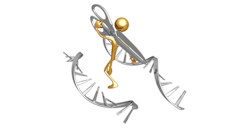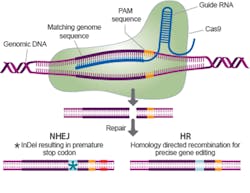China's New Industry: Genetic Engineering?
Chinese scientists are embarking on what appear to be the first human trials with the Crispr gene editing tool, the latest effort by the country’s researchers to master a technology that might someday be a potent tool in developing therapies worldwide.
The group led by Lu You, an oncologist at the south-western Sichuan University West China Hospital, has recruited the first patient for a ten-people clinical trial, which will activate immune cells using Crispr and infuse them back into patients to fight lung cancer. Due to potential risks in using the pioneering treatment for humans, the team has decided to treat the first group of three patients one at a time, Lu said in a phone interview.
Formally called Crispr-Cas9, the genetic editing tool acts like a pair of precise molecular scissors that can cut out unwanted sections of DNA and insert desired ones. The team is using it to remove a gene that encodes a protein named PD-1, which normally keeps the immune cells in check but is also used by cancer cells to hide from the immune system.
CRISPR Cas9 gene editing tools have been adapted from a prokaryotic immune system to provide sequence specfic genome targeting of any species. The nucleaseintroduces double stranded breaks. The break is repaired by one of two mechanisms:1. Non-homologous end joining (NHEJ) which creates random insertions or deletions (indels) at the targetd site or 2. Homologous recombination which creates precise changes based on template DNA.
Source: Transomic Technologies
The engineering is intended to switch on the immune response to attack cancer. In the pharmaceutical industry, antibody drugs directly blocking the PD-1 protein including Merck & Co.’s Keytruda and Opdivo sold by Bristol-Myers Squibb Co. have become new growth engines for the companies.
"If this technology has good safety and shows certain efficacy, it has wide applications," said Lu. If successful, it has the potential to become an alternative biotechnology treatment to replace or complement the existing single antibody drugs, Lu said. Lu’s group received approval from the ethics board of the West China Hospital, one of the top facilities in the country.
Early Stage
They will observe the first patient for two months after injecting the Crispr-edited cells and if there is no problem, proceed to give the second patient the same treatment. If the first group of three patients responds well, they may be able to accelerate after that.
"We’ve learnt from past lessons that safety comes first. You have to make clear its safety profile before its preliminary efficacy can be discussed," said Lu. Patients must have the PD-L1 bio-marker and should have tried three to four lines of existing treatments available in China and failed to benefit from them, he said.
Lu acknowledges it is still very early days. The Phase I trial only tests if the technology is safe and Lu said his biggest worry is about overly activated immune cells attacking not just the cancer but also healthy cells, creating conditions similar to autoimmune diseases like lupus. Another problem is the possibility of unwanted mutations happening at sites other than the intended gene.
Chinese scientists have said they were among the first in using Crispr to make wheat resistant to a common fungal disease, dogs more muscular and pigs with leaner meat. In the southern city of Guangzhou, Chinese researchers sparked an international ethical debate last year after tweaking the genetic make-up of human embryos using Crispr for the first time.

